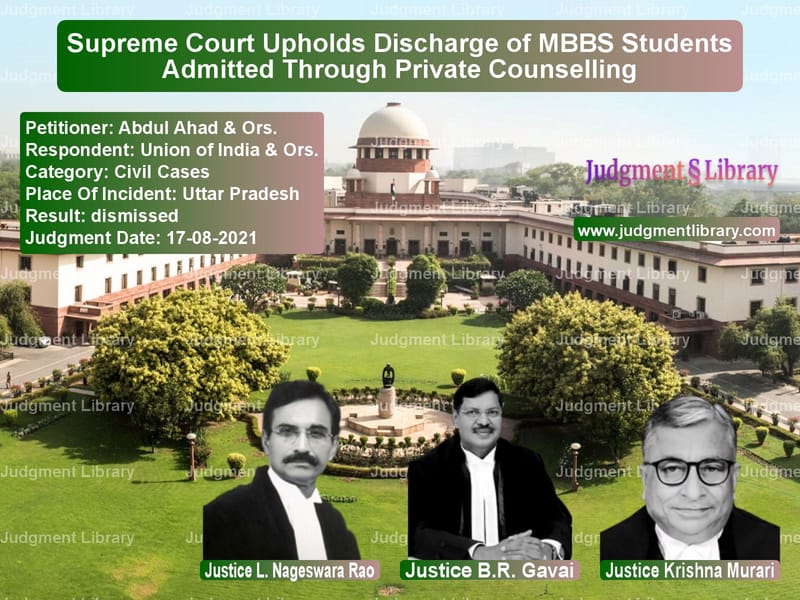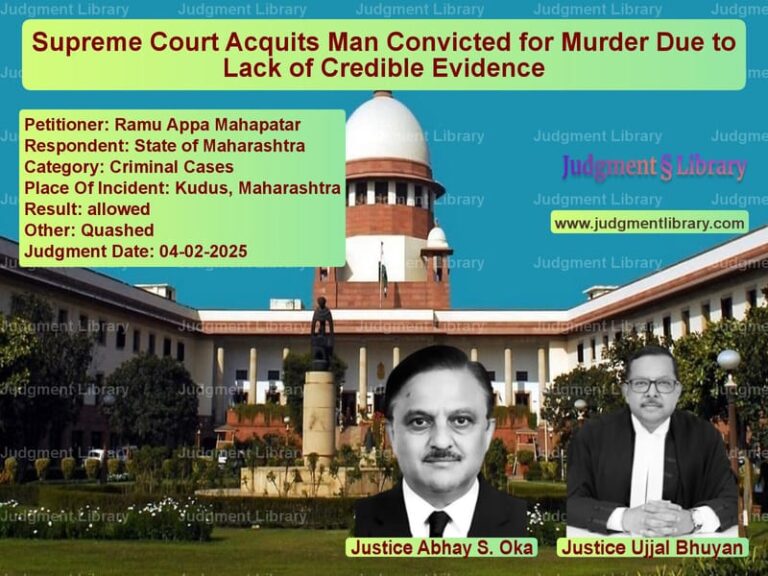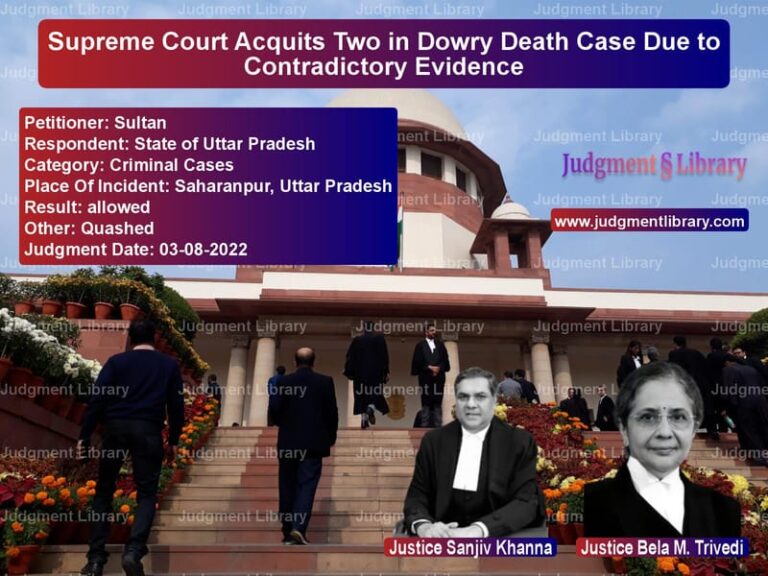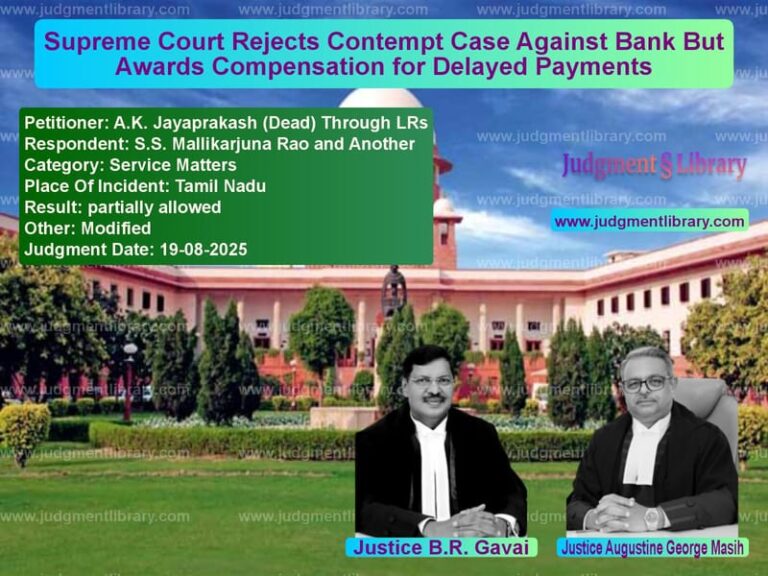Supreme Court Upholds Discharge of MBBS Students Admitted Through Private Counselling
The case of Abdul Ahad & Ors. v. Union of India & Ors. involved the dismissal of a review petition challenging the Supreme Court’s previous order upholding the discharge of students admitted to an MBBS course through private counselling in violation of government directives. The Court ruled that the admissions conducted by Glocal Medical College, despite a clear mandate for centralized counselling, were illegal and could not be protected.
Background of the Case
The review petitioners were students admitted to the MBBS program at Glocal Medical College for the academic session 2016–2017. The college was affiliated with Glocal University, a deemed university. The students had qualified the National Eligibility cum Entrance Test (NEET) in 2016 and claimed that their admission was valid. However, their admissions were not through the centralized counselling mandated by the Uttar Pradesh government.
On 22 August 2016, the Uttar Pradesh government issued a notification requiring all MBBS/BDS admissions in the state, including private institutions, to be conducted through centralized counselling based on NEET scores. Despite this, Glocal Medical College conducted its own private counselling and admitted students, bypassing the government’s process.
Key Issues Raised
- Whether the students’ admissions, made through private counselling instead of centralized counselling, were valid.
- Whether the students, who had already completed part of their MBBS course, should be allowed to continue.
- Whether the notification mandating centralized counselling was binding on all medical colleges, including deemed universities.
Petitioner’s Arguments
The review petitioners argued that:
- They had qualified NEET and were eligible for admission.
- Their admissions were conducted by Glocal Medical College, which they believed was a legitimate authority.
- They had already completed their first and second years of MBBS, and it would be unfair to cancel their admissions at this stage.
- Their results for the first-year MBBS examination had already been declared, and they were continuing with their education.
Respondent’s Defense
The Medical Council of India (MCI) and the State of Uttar Pradesh defended the discharge order, arguing that:
- The students were admitted in clear violation of the government’s centralized counselling mandate.
- Glocal Medical College had no authority to conduct private counselling.
- The notification of 22 August 2016 had the force of law and was upheld by the Allahabad High Court.
- The students gained admission through “backdoor entry” and were not entitled to any equitable relief.
High Court and Supreme Court Proceedings
The Allahabad High Court upheld the Uttar Pradesh government’s decision to conduct centralized counselling and ruled that private counselling by any medical institution was illegal. Glocal Medical College and the affected students challenged this decision in the Supreme Court.
In an interim order dated 20 March 2017, the Supreme Court allowed the students to appear in their examinations but barred the publication of their results. However, Glocal Medical College still allowed these students to progress in their studies.
The Supreme Court subsequently upheld the discharge order issued by MCI, ruling that the admissions were illegal. The students then filed a review petition seeking reconsideration of the judgment.
Supreme Court’s Ruling
The Supreme Court dismissed the review petition, reiterating its previous judgment that:
- Admissions conducted through private counselling were illegal and in violation of the government’s directives.
- The students were not entitled to continue their studies as their admissions were invalid from the outset.
- Allowing such admissions would set a dangerous precedent and undermine the merit-based medical admission system.
Key Observations from the Judgment
The Court emphasized the importance of adherence to the admission process:
“The admissions which were conducted through private counselling cannot be termed as anything else but per se illegal.”
The judgment also highlighted that:
“Though we have all the sympathies with the students, we will not be in a position to do anything to protect the admissions, which were done in a patently illegal manner.”
Final Judgment
The Supreme Court dismissed the review petition and ruled that:
- The students could not claim any rights based on their illegal admissions.
- Glocal Medical College’s actions were unlawful, and its private counselling had no legal standing.
- Future admissions must strictly adhere to the centralized counselling process.
Impact of the Judgment
The ruling reinforced the legal principle that all medical admissions must be conducted through transparent, merit-based procedures. Key takeaways from the case include:
- Centralized counselling is mandatory for all medical colleges, including private institutions.
- Admissions obtained through private counselling are illegal and will not be protected by courts.
- Students must ensure that their admissions comply with government regulations to avoid legal consequences.
Conclusion
The Supreme Court’s decision in Abdul Ahad & Ors. v. Union of India & Ors. serves as a warning to medical institutions and students that merit-based admissions must be strictly followed. The ruling upholds the integrity of the medical education system and ensures that no unfair advantage is granted through unauthorized processes. Students and institutions must comply with legal mandates to avoid similar consequences in the future.
Petitioner Name: Abdul Ahad & Ors..Respondent Name: Union of India & Ors..Judgment By: Justice L. Nageswara Rao, Justice B.R. Gavai, Justice Krishna Murari.Place Of Incident: Uttar Pradesh.Judgment Date: 17-08-2021.
Don’t miss out on the full details! Download the complete judgment in PDF format below and gain valuable insights instantly!
Download Judgment: abdul-ahad-&-ors.-vs-union-of-india-&-ors-supreme-court-of-india-judgment-dated-17-08-2021.pdf
Directly Download Judgment: Directly download this Judgment
See all petitions in Public Interest Litigation
See all petitions in Education Related Cases
See all petitions in Judgment by L. Nageswara Rao
See all petitions in Judgment by B R Gavai
See all petitions in Judgment by Krishna Murari
See all petitions in dismissed
See all petitions in supreme court of India judgments August 2021
See all petitions in 2021 judgments
See all posts in Civil Cases Category
See all allowed petitions in Civil Cases Category
See all Dismissed petitions in Civil Cases Category
See all partially allowed petitions in Civil Cases Category







